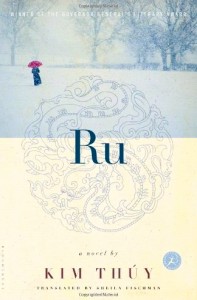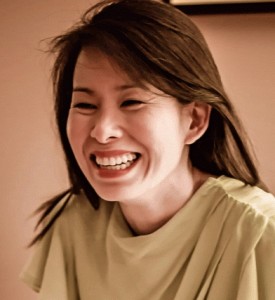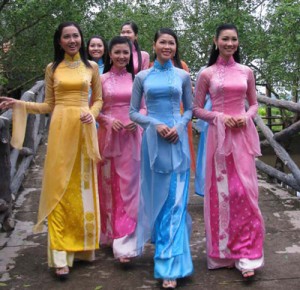This novel was WINNER of Canada’s Governor General’s Award for French Language Fiction in 2010.
“My parents often remind my brothers and me that they won’t have any money for us to inherit, but I think they’ve already passed on to us the wealth of their memories allowing us to grasp the beauty of a flowering wisteria, the delicacy of a word, the power of wonder. Even more, they’ve given us feet for walking to our dreams, to infinity. Which may be enough baggage to continue our journey on our own.”
 Timeless in its themes and completely of the moment in its narrative voice, Kim Thuy’s Ru brings to life the innermost thoughts of one of Vietnam’s “boat people.” The author, whose family emigrated from Vietnam to Canada when she was ten, has created a vibrant novel that feels much more like a memoir than fiction, with a main character whose life so closely parallels that of the author that her publisher’s biography for her is virtually identical in its details to the factual material in the novel. Few, if any, readers will doubt that the author actually lived these events – her voice is so clear and so honest that there is no sense of artifice at all.
Timeless in its themes and completely of the moment in its narrative voice, Kim Thuy’s Ru brings to life the innermost thoughts of one of Vietnam’s “boat people.” The author, whose family emigrated from Vietnam to Canada when she was ten, has created a vibrant novel that feels much more like a memoir than fiction, with a main character whose life so closely parallels that of the author that her publisher’s biography for her is virtually identical in its details to the factual material in the novel. Few, if any, readers will doubt that the author actually lived these events – her voice is so clear and so honest that there is no sense of artifice at all.
A series of vignettes, presented in the “random” order in which the main character, Nguyen An Tinh, appears to have remembered them, allows the author to move around through time and memory, while also allowing the reader to participate, for short moments, in events that would otherwise feel alien in time and place. The action, often dramatic, just as often reflects the quiet , loving experiences of a family’s life; descriptions of hardship and deplorable, even repulsive, conditions are balanced by the author’s ability to see beauty in small, even delicate, moments. The shocking contrasts between Nguyen’s privileged life in Saigon and her subsistence level existence upon her first arrival in Canada are presented with complete honesty and so broad a perspective that Nguyen is able to face her new life without rancor, resentment, or any sign of self-pity, and that becomes this novel’s biggest strength.
, loving experiences of a family’s life; descriptions of hardship and deplorable, even repulsive, conditions are balanced by the author’s ability to see beauty in small, even delicate, moments. The shocking contrasts between Nguyen’s privileged life in Saigon and her subsistence level existence upon her first arrival in Canada are presented with complete honesty and so broad a perspective that Nguyen is able to face her new life without rancor, resentment, or any sign of self-pity, and that becomes this novel’s biggest strength.
The novel opens with Nguyen An Tinh’s birth, like that of the author, in the Year of the Monkey, during the Tet (New Year) Offensive in 1968, in Saigon, “when the long chains of firecrackers draped in front of houses exploded polyphonically, along with the sound of machine guns…The skies [were] adorned with fireworks [and] decorated with garlands of light, shot through with rockets and missiles.” Ten years later, when her family finally decides to escape their war-torn country, they find themselves in the hold of a boat with two hundred other people and so little room they are essentially paralyzed. Though there is no sanitation and many sick people, they still feel grateful that they are able to escape at all, though terrified that the boat might be attacked by communists or pirates, either of which would probably kill them. After days on this boat, they arrive in Malaysia, and within fifteen minutes of their arrival, their now-empty boat sinks without warning.

Mirabel Airport, Montreal
After some weeks in a refugee camp, the family eventually arrives at Montreal’s Mirabel Airport in the winter, and Nguyen is astonished to see an ice sculpture greeting them. “After such a long time in places without light, a landscape so white, so virginal could only dazzle us, blind us, intoxicate us.” Presented with a welcoming table filled with canapés and colorful hors d’oeuvre, all of these tidbits completely unknown to her, she still realizes that “this was a place of delights, an idyllic land.” This was not all pleasure, at first, however. “I was neither deaf nor mute [but] I now had no points of reference, no tools to allow me to dream, to project myself into the future, to be able to experience the present, in the present.” With astonishing support from her teachers and the parents of the other children in her school, who invite each of the newcomers home for lunch, Nguyen recognizes their kindness and warmth, even though she has no idea how to use a fork and can not recognize any of the foods she is being served. The town’s volunteers take the family to a flea market to find mattresses and household equipment, and even help negotiate prices (though the flea market mattresses turn out to have real fleas), revealing their big hearts and desire to help, though they have no real understanding of the Vietnamese people or their culture.

Granby, where Nguyen lived, in winter
Time skips back and forth between Nguyen’s early life, her arrival in Canada, and her adulthood, as she remembers events in which people she knows experience life-changing events. A doctor wanted by the communists in Saigon buys places for each of his five children on separate boats out of Vietnam, assigning each of them to the care of a Canadian priest, hoping that some of them will survive. In their Saigon house, her father introduces the young communist soldiers who occupy it to piano music, which they have never heard before, having been conscripted as twelve-year-olds and denied any opportunity to experience the arts. In a wonderful episode which explains sympathetically how naive these young soldiers are when they must record the family’s possessions for eventual sale by the communists: A collection of brassieres owned by the women in the family mystifies them, and they conclude that these must be coffee filters used when the women want to make two cups of coffee to share with a friend.

Traditional ao dai of Vietnam, which Nguyen rediscovers on her return to Vietnam
Dozens of other enlightening episodes are recorded here, with moments of great poignancy and sadness contrasting with lovely and loving stories that reveal character and a sense of adventure as the novel weaves back and forth in time. It is Nguyen’s sense of adventure which explains why she, in adulthood, eventually returns to Vietnam to work for three years before returning to Canada. Now, as the mother of two sons, and a professional with advanced degrees, Nguyen is determined to preserve her immigrant history for her sons – she knows that specific events like the ones she records here will never be recorded in history books. In sharing her story, the consummate story of the immigrant experience, Nguyen benefits her readers, as well. As her mother once said: “Life is a struggle in which sorrow leads to defeat.” Despite the hardships her family and other immigrants have faced, Nguyen (and one presumes, the author) looks only to the present and the future. There is no sorrow here – or self-pity. Only joy.
Photos, in order: The author’s photo is from http://www.lapresse.ca
Mirabel Airport is depicted here: http://digital-possibilities.com
Granby in the winter may be found on: http://www.northstartravel.ca
The traditional ao dai dress from Vietnam may be seen here: http://visaforvietnam.org
ARC: Bloomsbury
